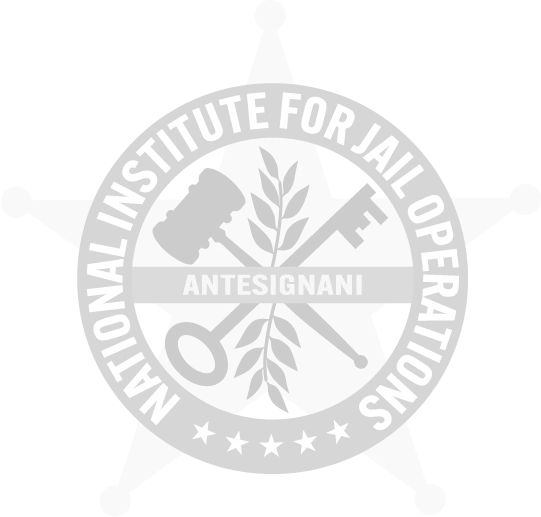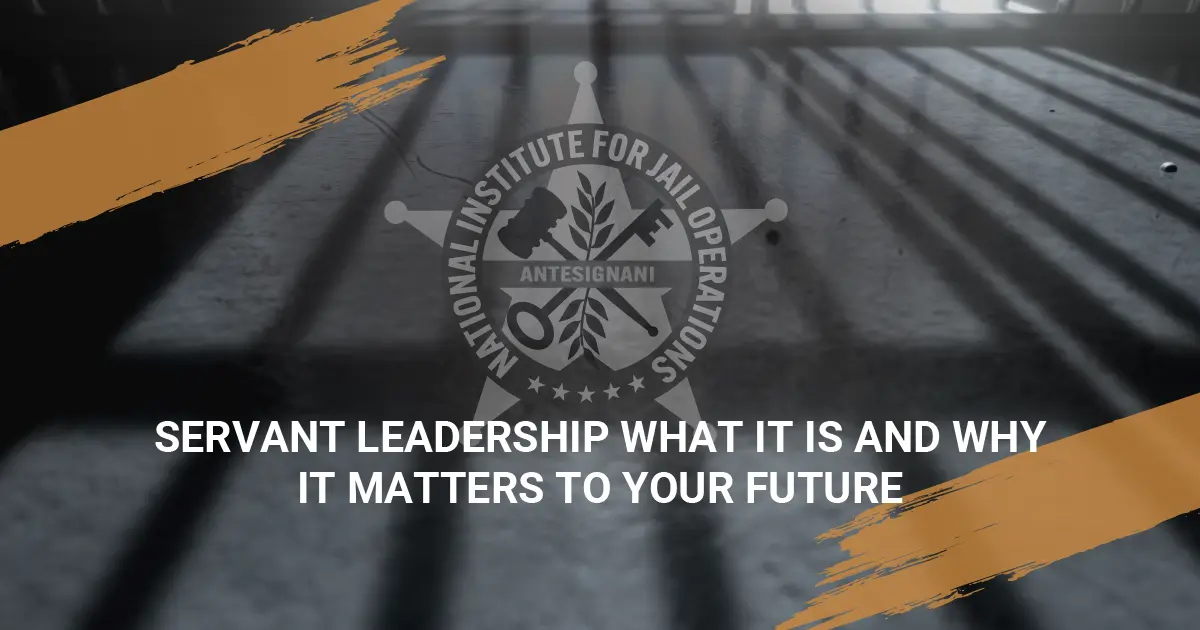By Expert: Kurt Braatz
Servant leadership is a leadership model meant to replace typical command and control models of leadership, common in law enforcement, to be more focused on the needs of others. In the detention/corrections setting, others can mean many things – community, staff, inmates, board of commissioners, taxpayers etc. In our role as professional detention and corrections officers we serve all of those entities.
To really understand why it’s important to “serve” others you must first take a look at what being a good steward means. Stewardship is the careful and responsible management of something entrusted to one’s care. How admirable it is to have another person entrusted to your care. Your obligation is to keep the community safe by preventing escape, a simple enough concept, but includes keeping those in our care safe as well. To accomplish this task we detain or incarcerate those adjudicated by a lawful authority. You do this by hiring, training and retaining excellent staff. In all things, keep it simple.
In the first few days and weeks as a new officer you were likely only provided with just enough instruction to keep yourself in line and safe. For me, to try to take in anything else would have put my brain at critical mass. I was concerned about my uniform, being on time, keys, logs, perimeter checks, security checks, shake downs, 10-codes, finding my way around in the facility, programs, meals, inmate request forms, and all the while listening, watching, and learning all I could, as fast as I could. Early on I saw what more experienced officers were doing and I wanted that freedom so I could explore new opportunities within the facility. As far as being a good steward went, my obligation was minimal, it consisted of having a good shift, taking care of the little things and going home safe.
As you learn and grow in your career you will have the opportunity to explore more than you previously could as a line level officer. Given the chance, we test for promotion and seek out assignments that look interesting, at least more interesting than our current assignment. With that added opportunity, we find that our responsibilities include far more than just safety and preventing escape. As it relates to inmates we are responsible for essentially everything they need. Line staff take care of many things at once – food, clothing, shelter, medical-dental-vision, and visits with attorneys, family or friends, opportunities to recreate or to buy items from commissary.
By coordinating efforts to provide the basic necessities, we work on system improvements to ensure we fulfill the mission of the organization. Operationally, through classification, inmate safety is improved. Managing crowding and inmate conflicts improves officer safety. Education and programming opportunities in the facility help to reduce recidivism and thereby, improve community safety. We realize the impact of what seemingly is a revolving door system and start to put some effort into making change. Not change for change sake. Real, appropriate, change.
There are system improvement opportunities. Identify new ways to facilitate housing assignments, or a new classification system, or new ways to expedite bookings and releases. We get creative because we have to. We have to, because our profession is always changing. As Jack Welch says, “Change before you have to.” To a degree, this is hard to do because you don’t know what you don’t know until you know. And who will help us find out what we don’t know? The inmates? They are constantly adapting to change and finding our weaknesses. Being a more experienced steward, we use our expertise in the field to teach others how, and why, our role as professional detention/corrections officers is so important.
As our careers develop further, we find ourselves in a new role as a supervisor, someone responsible for the safety of other staff, proper resource allocation, and minimizing wasteful practices. Our awareness expands when we consider the facility and those working and living within it, the future of our organization and the health of our budget. In an effort to take care of our staff, we learn that there is a much bigger picture out there than was first in our field of view as a new officer. We are still learning what it means to “serve” others and to be a good “steward”.
As we spend time as a supervisor our vision of what drives the system becomes clearer and we learn that there are many external influences that put pressure on our facility. When considering recruiting opportunities, hiring pools, trained staff, crowded facilities, budget and public expectations, resources are scarce. As we watch supervisors that have gone before us we begin to yearn for what they know to enhance our own expertise. We begin to notice that things are different than when we started. We realize that our supervision techniques must also change.
- To be an effective leader we begin to question.
- Why is the population changing?
- What about the inmate population is changing?
- Are there system changes that impact what our jail or prison population looks like?
- Are there new technologies available?
- Are there new updates in case law that drive operational decisions?
- Do we understand the historical influences on previous operations or policy?
- How are officer training requirements and needs changing?
By asking these questions we are going deeper in our quest to learn what it means to become a leader in our field. With this knowledge we recognize and develop leadership potential at every level in the organization. Effective servant leaders continually explore stewardship opportunities within the facility or complex. Become a successful steward to those entrusted to your care. Seek out alternatives to the status quo and always question to see if there is a better way. Don’t ever stop learning how to develop new opportunities for yourself and for others within your organization.
Kurt Braatz, MPA, CJM, SPHR, served as Detention Services Commander for the Coconino County Sheriff’s Office in Flagstaff, Arizona prior to his retirement in December 2013. He is a Technical Resource Provider for the National Institute of Corrections. Kurt is also a facilitator for the Myers Briggs Type Indicator MBTI® training. Kurt earned a Bachelor’s Degree in Political Science and a Master’s Degree in Public Administration from Northern Arizona University. He has held the distinction as a Certified Jail Manager since 2009. He also graduated from Northwestern University’s School of Police Staff and Command Class #227 in June 2006, the International Association of Chiefs of Police Leadership in Police Organizations Training Course in October 2007, the Flagstaff Leadership Program May 2011, and attended the Correctional Leadership Development course in July 2011 at the National Corrections Academy. He achieved certification as a Senior Professional in Human Resources in July 2015.
Kurt joined the Arizona Counties Insurance Pool in January 2014 as a Loss Control Manager. His responsibilities include reducing claims in liability, property and workers’ compensation for twelve Arizona counties.



